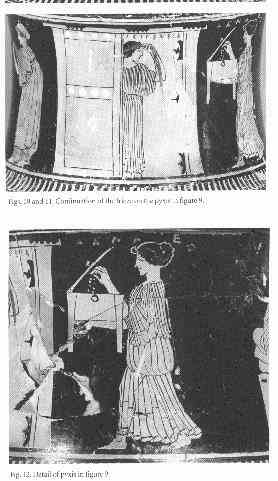Pandora
She never had a box!
Pandora's "box" is a modern invention going back only as far as Erasmus. According to Hesiod, the evils of all men were shut up in a storage jar (pithos) buried in the ground. This is connected by some with the Athenian festival of pithoigia, - when the great vats (pithoi) of new wine were opened. Perhaps that's really where all mankind's troubles spring from! She, as the first woman, created after man, is sometimes compared to Eve in Hebrew myth. Pandora was originally a title of the goddess Rhea (the name means all gifts) - but the story of Pandora and her jar (not box) was probably an anti-feminine invention of the poet Hesiod.

Hesiod tells the story in his Works and Days (and again, slightly differently in the Theogony). First note that she is not like her Jewish counterpart: Eve was created to soothe Adam's loneliness, and to help him as a partner. Pandora, the first woman in Greek myth, was created as a punishment to mankind. Her name by the way does not mean "giver of all gifts" - rather "she to whom all gifts were given" - the gods gave her beauty (Aphrodite), skill (Athena), while Hermes gave her a doglike (bitch-like?) mind and a thieving nature. "All (pantes) the gods gave her gifts (dora), a sorrow to men who live on bread." Zeus wanted to punish mankind for Prometheus' theft of fire - he decided to give them a "beautiful evil" (kalon kakon) "to pay for fire" (anti pyros). Hephaestus makes the woman out of earth and water, to look like a goddess. She is sent as a bride to Epimetheus, stupid brother of the smart Prometheus, although he'd been warned not to take any gifts from the gods. Her first act was to take the lid off the jar, whereupon all the evils and diseases were released, and immediately spread all over the world. Only "Hope" was left in the jar. Thus Pandora - and through her all women, who are her descendants - has a beautiful exterior, but is worthless inside. In return for the stolen fire, she is a thief, who burns men up with her appetite for food (she's a parasite who has to be fed) and sex. As Hesiod suggests, a woman is ambiguous: she is weak, but can control a man through her appetites in bed and at table: she can make him both feeble and poor.
"Don't let a woman, wiggling her behind,
And flattering and coaxing, take you in;
She wants your barn: woman is just a cheat."But even if Pandora had a jar and not a box, women as portrayed in ancient art are forever putting things tidily away in boxes of various kinds. There's even the myth of Danaë, where she and her son Perseus were themselves tidied away in a box and dumped at sea. François Lissarague has discussed the idea that the box is symbolic of womens' life in Athens - she was to a large extent herself seen as a container - for the sperm, for the child, who spent most of her life in a container (house) designed for the purpose of allowing no unauthorised person to open the box (see my Lysias page and related pages).

Look at this image which is superbly rich in irony. The picture is on a pyxis (round pottery box) - of a type used to store jewelry etc
for a young girl's dowry. On the box is a picture of a young girl with a box - and the painter has added the name Danaë (although the picture is nothing to do with her myth). And on the left of the girl - its opening echoing the opening of the box - is the door of her new house (oikos). It's as if by opening the jewel box she's being distracted from the real box, which she's walking into obliviously - a box that will contain her for the rest of her life until she's carried out in another box.

